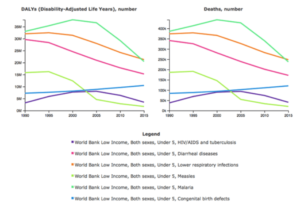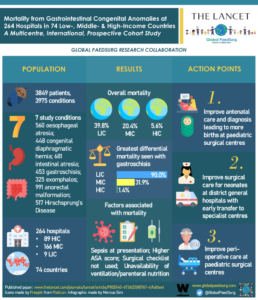WHAT IS THE GLOBAL PAEDSURG PROJECT?
It is a multi-centre prospective cohort study of congenital anomalies to compare outcomes between LMICs and high-income countries (HICs) globally.
What is a prospective cohort study?
What are the study aims?
- To address the current scarcity of research on congenital anomalies, particularly from low- and middle-income countries (LMICs), by undertaking the first large series, geographically comprehensive multi-centre prospective cohort study of congenital anomalies across the globe. Such data is vital to inform advocacy efforts and global health prioritisation
- To identify factors affecting outcomes of children with congenital anomalies to improve care.
- To enhance research capacity amongst collaborators and combat the huge disparity in research outputs between low-, middle- and high-income countries at present.
- To form a global paediatric surgical research collaboration to enable further research and intervention studies aimed at improving outcomes.
WHY CONGENITAL ANOMALIES?

In 2015, the Global Burden of Disease Study reported that congenital anomalies have risen to become the 5th leading cause of death in under 5-year olds globally. In real terms, this equates to almost half a million deaths/ year, with 97% of those deaths in LMICs.
At present, there is a stark scarcity of research on congenital anomalies from LMICs. Taking congenital diaphragmatic hernia as an example, we could identify just 14 studies on this condition from LMICs. Yet hundreds of studies have been published on the same condition from high-income countries. In addition, the LMIC studies that have been published are mostly single institution, small series, retrospective studies.
Why is this study of interest to CDH UK?
It is important because we are here to support anyone affected by Congenital Diaphragmatic Hernia and that includes patients, healthcare providers and researchers and this study should provide useful information to improve outcomes globally and to help with further research.
How Can CDH UK Help with the study?
We can provide our views on certain aspects of the study and we can assist in publicising the study and sharing it with our connections to hopefully see more collaborators join the project.
Where can I find out more about this study?
You can visit the Global Paedsurg website here http://globalpaedsurg.com/about-study/
The Results
We are pleased to bring you the results of the study, which were published in The Lancet. This is an infographic to make the results much easier to understand! Just to remind you that LIC means Low Income countries, MIC means Middle Income Countries and HIC means High Income Countries.
CDH UK was not involved in the production of the below infographic.



